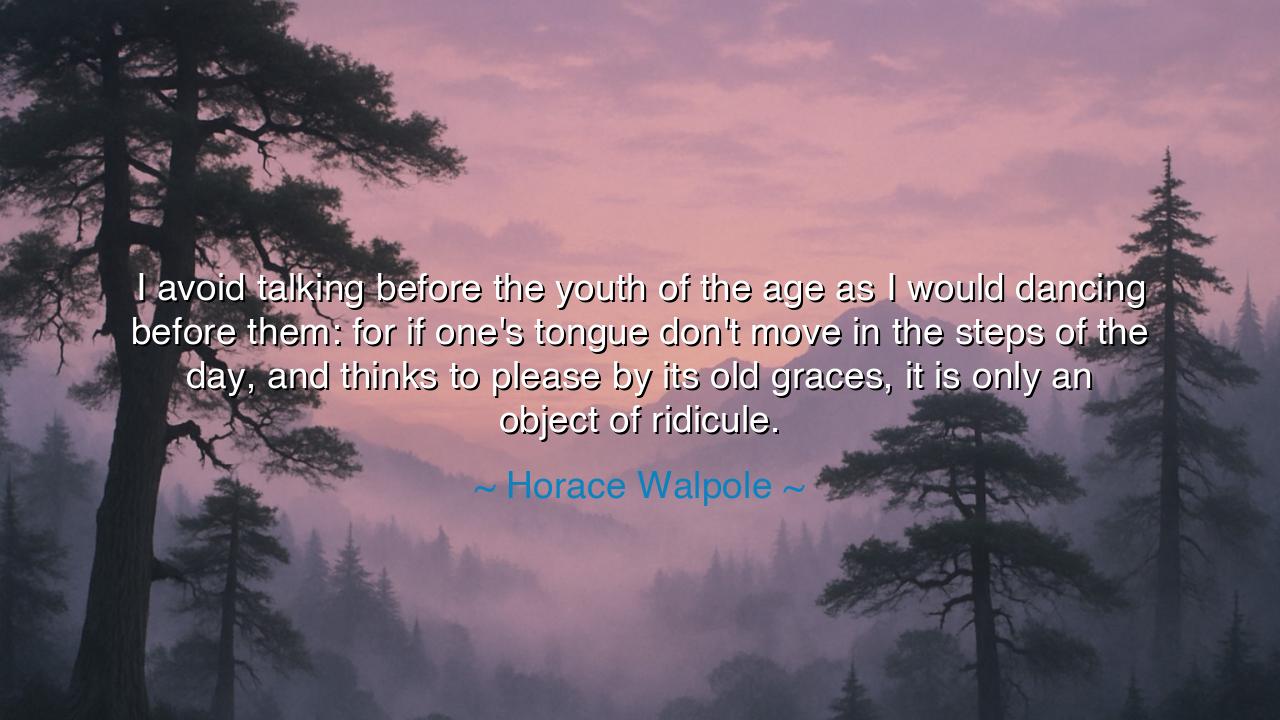
I avoid talking before the youth of the age as I would dancing
I avoid talking before the youth of the age as I would dancing before them: for if one's tongue don't move in the steps of the day, and thinks to please by its old graces, it is only an object of ridicule.






In the quiet moments of reflection, Horace Walpole—a man of intellect and wit—shared with the world a profound insight on the nature of speaking and the passage of time. “I avoid talking before the youth of the age as I would dancing before them: for if one's tongue don’t move in the steps of the day, and thinks to please by its old graces, it is only an object of ridicule.” These words carry a deep, almost prophetic wisdom that transcends the barriers of time and place. For in them, Walpole speaks not only of the generation gap that often divides the old from the young, but of a deeper truth about change and the inevitability of evolution.
What, then, does Walpole teach us about the relation between the old and the new? He compares the youth of the age—those who live in the present moment, whose thoughts and actions are governed by the tides of the current time—to dancers in the midst of a performance. The older generations, in their desire to connect with the young, sometimes hold on to the old ways, the old manners, the old forms of expression. But, just as a dancer who cannot keep up with the rhythm of the music becomes an object of ridicule, so too does the speaker who fails to speak in the language and spirit of their time. This is no simple matter of fashion or preference; it is a matter of relevance, of understanding the changing pulse of the world and the hearts of those who live within it.
Think, if you will, of the story of the philosopher Socrates, who lived in a world that seemed to be shifting beneath his very feet. In his time, the youth were beginning to question the old gods, the old traditions, and the old ways of thinking. Socrates, wise and firm in his beliefs, did not simply speak in the ancient tongues of the philosophers before him; instead, he adapted to the changing times. His method was to ask questions, to challenge the assumptions of the age, and to stir the minds of the young in a way that was in tune with the new world emerging. Had Socrates clung too tightly to the old forms of wisdom, had he spoken only in the language of ancient thinkers, he might have been seen as irrelevant. But instead, he became a figure who transcended time, a man whose words still echo through the corridors of history because he spoke in the moment.
But Walpole’s warning goes beyond the mere practicality of adapting one’s speech. There is an inherent truth in his words that speaks to the eternal tension between the old and the new. The natural cycle of life brings forth each generation with its own ideas, ideals, and aspirations. While the wisdom of the past is a treasure, it must not be frozen in time. It must be passed down alive, with all the vibrancy and relevance it can offer to those who inherit it. When the elder speaks, their words must be alive with the spirit of the age, for that is how they will touch the hearts of the young. A timeless truth loses its power when it is insulated from the world it was meant to speak to.
Let us consider the example of Leonardo da Vinci, whose brilliance was not just in his masterpieces but in his ability to adapt to the changing currents of thought in his time. In an era of incredible scientific and artistic revolution, da Vinci understood that true genius lies not in staying fixed in the past, but in embracing the new. His work in anatomy, his exploration of flight, and his revolutionary artistic techniques all spoke to a mind deeply engaged with the present, eager to understand the world as it was and to bring forth new creations that would last for centuries. He did not cling to the old, but instead, he spoke in the language of his age—and thus, his legacy endures.
Thus, Walpole’s lesson is clear: in our own lives, we must be willing to evolve. The wisdom of the past is a foundation, not a shackle. To speak to those younger than us, we must first understand them, engage with the times they live in, and speak to them in their own language. The world of today is not the world of yesterday, and it will not be the world of tomorrow. The tools of our communication, our thoughts, and our ideas must grow and change with the world, or they risk becoming as irrelevant as an old, forgotten dance. To live with purpose is to adapt, to find new ways to speak truth, wisdom, and beauty in the world that exists now, not the one that was.
Let this be the guiding principle of our actions. Speak with vibrancy, with clarity, and with the awareness that each generation brings something new to the table. Do not fear to embrace the present and the future, for in doing so, we honor the past. The greatest wisdom lies in the balance—understanding the roots of what has come before, while staying open and alive to the new ways of thinking, being, and speaking. If we can do this, we will speak with the power of the ages, a language that is at once timeless and fresh, and we will never be an object of ridicule, but a beacon of relevance and wisdom for the future.






AAdministratorAdministrator
Welcome, honored guests. Please leave a comment, we will respond soon